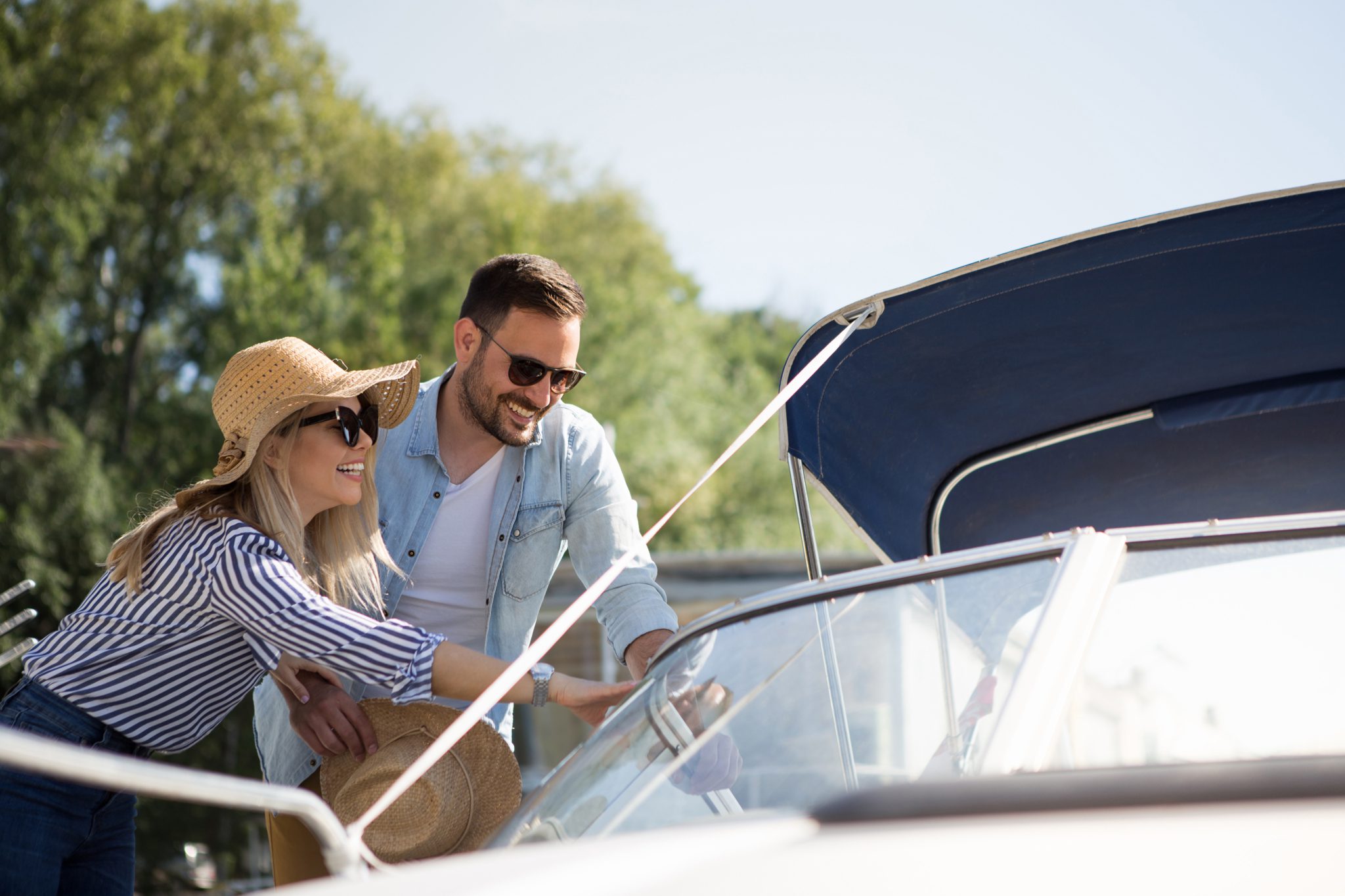In this section, you’ll find all of the other considerations you may need to think about when buying a boat. These include the process of buying a boat abroad, buying second-hand, the types of equipment you may need to purchase and the ongoing maintenance costs of running a boat.
- What do I need to know about buying a boat abroad?
- How does buying a second-hand boat differ from buying a new one?
- Can I still get finance on a second-hand boat?
- What are the types of safety equipment I should have when buying a boat?
- What are the optional accessories and upgrade options when buying a boat?
- What are the maintenance costs associated with owning a boat?
- What are the additional costs of owning a boat?
- How do I transport my boat?
What do I need to know about buying a boat abroad?
It might be that you are looking at boats available for sale abroad due to the availability and larger range of choice. Whilst it is true that there are further options available abroad, it is important to do your research and to make yourself aware of the processes involved and to avoid any hidden costs that you weren’t expecting.
If you’re struggling to find the type of boat that you’re in the market for locally in the UK, expanding your search abroad may well be a good solution – so the first step is to find a reliable and reputable international boat supplier that will be able to use their expertise and knowledge when helping you make a purchase abroad, as well as be on hand to answer any questions you need and act as a middle man when needed.
Having someone on hand that is knowledgeable about buying boats abroad will be handy when it comes to taxes and other regulations that may be in place when buying from a particular country. You may need advice when it comes to VAT status, RCD status and the process of organising and planning transport of the boat once purchased.
The impact of Brexit, VAT status, RGR, importing vessels into the UK and limited stays in Europe make this a complex process and it may be necessary to employ the services of a marine lawyer and VAT specialists. Some of these specialists are found here.
You will also need to consider FX transactions, boat surveys, flag nationality and registration.

How does buying a second-hand boat differ from buying a new one?
Buying second-hand is a cheaper solution to becoming a boat owner and can often be a positive experience. Whilst it might not be brand new in condition, once you’ve had a surveyor check that everything is as it should be and there aren’t any huge red flags in terms of the quality – you’ll be able to enjoy boat ownership in no time.
There are no manufacturing delays or lead times when buying a used boat, which means you can get on the water immediately.
Ask for maintenance records that show service records and what has been upgraded. If it is a used sailboat you are intent on buying, the better value between identical boats is more than likely reflected in the boat with the better sail inventory and lighter usage.
A used boat is a sensible choice if budget is a factor. If you buy a five-year-old model, for example, you could save up to half the price of a new boat which makes it an even more affordable option to finance. Used boats should have all of the snagging lists fixed leaving you untroubled apart from regular maintenance and servicing.
Regardless of whether you’ve bought a second-hand boat or you’ve bought from brand new, there are costs that you will expect to incur over time that remain the same. With your boats upfront costs paid for, you’ll also have the annual costs of owning your boat including the insurance, taxes, storage costs, fuel, equipment and ongoing maintenance.
Whilst buying a new boat may mean fewer costs for ongoing maintenance, to begin with, second-hand boats may well cost less in other areas including customisation and upgrade options if you’ve found a purchase that already contains these and were installed by the previous owner.
Buying new or used is a personal decision. Both have their benefits and downsides with different sets of potential issues. You just need to decide what suits your needs the best and your budget.
Can I still get finance when buying a second-hand boat?
Yes, you can finance a second-hand boat. At Promarine Finance we have flexible finance solutions. We do not set age limits on the vessels we finance, we just require them to be seaworthy, survey well and will not cost you excess money to own. Find more information here and use our online calculator to get a quote.
What are the types of safety equipment I should have when buying a boat?
It’s important to have the essential safety equipment items aboard before going on the water. Whilst the RYA advises that for Pleasure Vessels of less than 13.7 metres in length there are no statutory requirements for safety equipment other than those required under SOLAS V, it is still highly recommended that you equip your boat with suitable safety equipment to keep you and your passengers safe.
Some of the items you may want to consider having onboard include life jackets, buoyancy aids, life raft, EPIRB, VHF, safety lines, binoculars, GPS, a torch, handheld flares, fire equipment, first aid kit, wooden bungs, anchor, tools, spare fuel and a tow rope to name a few. Your surveyor will be able to assist with this.
What are the optional accessories and upgrade options when buying a boat?
There are several areas in which you can improve and upgrade your boat once purchased, starting from smaller more aesthetic details such as upholstery and seating covers through to larger upgrades such as a new motor, stereo, smart devices or upgraded lighting.
Accessories and upgrade options can help you make your boat feel like yours, and so that it reflects your personality – as well as options being available to increase storage solutions and comfort.

What are the maintenance costs associated with owning a boat?
The maintenance costs involved with owning a boat range from large and expensive projects to smaller and less costly items. Maintaining a boat is most likely the largest part when it comes to the annual expenses of owning a boat. To preserve the condition of your boat and maintain its quality, you will need to work on it little and often to keep it up to scratch.
The best way to keep your costs down is to carry out routine checks on your boat including inspecting the engine, rigging, sails, hull and other components of the type of boat you own. If you pick up areas of the boat that may be prone to damage or worsening you can nip it in the bud as soon as you spot it rather than letting it become a larger and more expensive problem down the road.
Sometimes you will need to replace complete components of your boat, rather than patch them up, which you may well need to budget for annually. You will also need to expect wear and tear related issues with your boat that you should keep the budget back for also.
Talk to your broker, surveyor, boat yard and boat users forums to find out more about your type of boat and likely operating costs.
What are the additional costs of owning a boat?
The additional costs of owning a boat can be seen listed below. Each of these has been discussed in previous chapters if you’d like to find out more information simply click on the item below and it’ll take you to the relevant section.
- Moorings
- Insurance
- Maintenance
- Upgrades
- Accessories
- Replacing items over time
- Equipment
- Fuel
- Surveys
Richard Bates, from Bates Wharf Marine Sales, discusses what to consider when buying a boat. Find out:
- how to choose an inland or ocean boat
- about electronic packages
- if GPS, and depth and radar tracking is included as standard
How do I transport my boat?
There are many ways to transport your boat home, or to the storage/mooring solution, you’ve put in place. You can organise for your boat to be transported by road, either by a professional and experienced company or if your boat is a smaller lighter model, you may be able to tow it yourself.
Transport by sea is also an option, again using a reputable company that has the experience or if the distance is short, sailing the boat yourself or recruiting the services of professional crew. It’s worth noting that transport by sea may be slower and of course, will be reliant on good weather conditions and will incur extra wear and tear.
Transport by ship for larger boats and models is a possibility, with a number of locations and ports to choose from. It’s important to do your research and select the option that works best for you and the boat you’ve purchased.
Continue Reading

Tips on how to get the most out of being a boat owner
Congratulations, you’re a boat owner! Whether you’re a first-time boat-owner or you’ve had experience with owning a vessel before – it’s an exciting time! Now you’ll be looking for ways…

Boat Buyer’s Guide Video Library
Welcome to the boat buyer’s guide video library. Below you can choose the category you’d like to skip to, each including some brilliant insights from a range of leaders in…
